Addis Capital Goods Finance Business S.co
አዲስ የካፒታል ዕቃ ፋይናንስ ን.ስ አ.ማ

Select Language









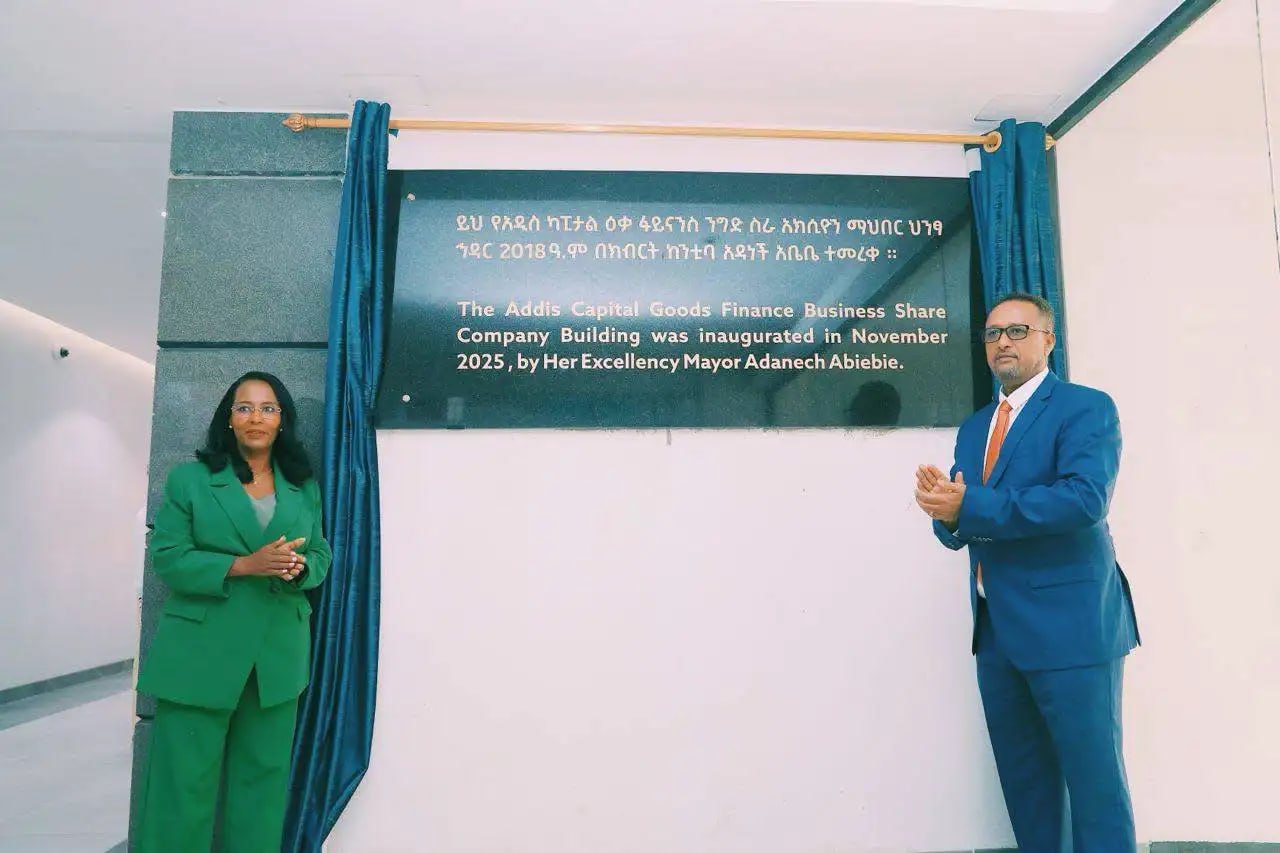
l
l

Mayor Adanech Inaugurates 11-Story Addis Capital Goods Finance Headquarters in Piassa (EBC)
Mayor Adanech Abiebie officially inaugurated and commissioned the new, modern 11-story headquarters of Addis Capital Goods Finance today in the heart of the Piassa district. The successful completion of the structure was highlighted as a demonstration of the city administration’s commitment to translating promises into action and delivering tangible results for residents.
The high-quality structure is seen as a key outcome of the city’s drive to follow through on major development initiatives, demonstrating a consistent effort to finalize projects and herald new achievements that directly benefit the local population.
Addis Capital Goods Finance functions as a vital alternative financial service, playing a key role in the urban economy. The institution is specifically focused on creating job opportunities for the city’s youth and women, fostering import substitution efforts, and supporting the production of goods capable of generating much-needed foreign currency. Furthermore, the company is actively working to expand technology transfer within its operational sectors.
The state-of-the-art building is designed to accommodate various services, making it suitable for banking, insurance, and professional office space. To ensure a productive and comfortable working environment for its staff, the facility includes comprehensive amenities such as a childcare center, a dedicated fitness and gymnasium area, and modern cafeterias.
Closing the ceremony, Mayor Adanech extended her gratitude to those involved in the successful completion of the project.
“I would like to once again congratulate and express our collective joy to the board members, management, employees, the contractor, and the consultant who all worked tirelessly for this success,” the mayor stated. “May God bless Ethiopia and its people!”

Mr. Mesay Ensene Managing Director
Current Situation of Lease Finance Institutions in Ethiopia
Overview of Lease Finance in Ethiopia
Lease finance has emerged as a significant mechanism for financing capital goods in Ethiopia, particularly as the country seeks to enhance its industrialization and economic development. The Ethiopian government has recognized the importance of lease financing as a means to facilitate access to machinery and equipment for businesses, especially small and medium-sized enterprises (SMEs) that may struggle to secure traditional bank loans due to lack of collateral or credit history.
Regulatory Framework
The regulatory environment for lease finance in Ethiopia is primarily governed by the Proclamation on Leasing Business No. 847/2014, which provides a legal framework for leasing activities. This proclamation aims to promote transparency and protect the rights of both lessors and lessees. The National Bank of Ethiopia (NBE) oversees the licensing and regulation of leasing companies, ensuring compliance with financial standards and practices.
Types of Lease Financing Available
In Ethiopia, lease financing typically encompasses two main types:
• Operating Leases: These are short-term leases where the lessor retains ownership of the asset, allowing businesses to use equipment without long-term commitment.
• Finance Leases: In this arrangement, the lessee has the option to purchase the asset at the end of the lease term, effectively making it a long-term financing solution.
Both types cater to different business needs and help companies manage cash flow more effectively.
Market Growth and Trends
The lease finance market in Ethiopia has been growing steadily over recent years. According to reports from various financial institutions, there has been an increasing trend among businesses to utilize leasing as a means of acquiring capital goods rather than outright purchases. This growth is driven by several factors:
• Economic Development Initiatives: The Ethiopian government’s focus on industrialization has led to increased demand for machinery and equipment across various sectors such as agriculture, manufacturing, and construction.
• Access to Finance: Leasing offers an alternative route for businesses that face challenges in accessing traditional bank loans due to stringent lending criteria.
• Flexibility: Leasing arrangements provide businesses with greater flexibility in managing their assets without significant upfront investment.
Challenges Facing Lease Finance Institutions
Despite its growth potential, lease finance institutions in Ethiopia face several challenges:
• Limited Awareness: Many potential clients remain unaware of leasing options or misunderstand how they work compared to traditional financing methods.
• Regulatory Constraints: While regulations exist, there can be inconsistencies in enforcement or clarity around certain provisions that may hinder operational efficiency.
• Economic Volatility: Fluctuations in economic conditions can impact businesses’ ability to meet lease obligations, leading to higher default rates.
Future Prospects
Looking ahead, there are promising prospects for lease finance institutions in Ethiopia:
• Increased Investment: With ongoing infrastructure projects and foreign direct investment inflows into various sectors, demand for leasing services is likely to rise.
• Technological Advancements: The adoption of digital platforms for leasing transactions could streamline processes and improve customer experience.
• Policy Support: Continued government support through favorable policies could enhance the attractiveness of leasing as a financing option.
In conclusion, while there are challenges that need addressing, the landscape for lease finance institutions in Ethiopia appears positive with significant opportunities for growth driven by economic development initiatives and increasing awareness among businesses about alternative financing options.



Current Status of Lease Finances in Ethiopia: Addis Capital Goods Finance Business S.C.
Overview of Lease Financing in Ethiopia
Lease financing has become an increasingly important aspect of the financial landscape in Ethiopia, particularly as the country seeks to enhance its industrialization and infrastructure development. The Ethiopian government has been promoting lease financing as a means to facilitate access to capital for businesses that may not have sufficient collateral for traditional loans. This approach is particularly relevant for sectors such as manufacturing, agriculture, and construction.
Role of Addis Capital Goods Finance Business S.C.
Addis Capital Goods Finance Business S.C. is one of the prominent players in the Ethiopian leasing market. Established to provide financial solutions specifically tailored to the needs of businesses seeking to acquire capital goods, the company focuses on offering lease financing options that allow firms to obtain equipment and machinery without the need for large upfront investments.
Current Market Dynamics
As of December 2024, the leasing sector in Ethiopia is experiencing growth driven by several factors:
• Government Support: The Ethiopian government has implemented policies aimed at promoting leasing as a viable alternative to traditional financing methods. This includes regulatory frameworks that support leasing operations and tax incentives for both lessors and lessees.
• Increased Demand: There is a growing demand for capital goods among businesses looking to expand their operations or modernize their equipment. Industries such as agriculture, construction, and manufacturing are particularly active in seeking lease financing options.
• Economic Growth: Ethiopia’s economy has shown resilience despite global economic challenges, with continued investment in infrastructure projects and industrial parks contributing to a favorable environment for leasing activities.
.
Challenges Facing the Leasing Sector
Despite these positive trends, there are still challenges that affect lease financing in Ethiopia:
• Limited Awareness: Many potential clients remain unaware of how leasing works or its benefits compared to traditional loans.
• Regulatory Hurdles: While there have been improvements, some regulatory barriers still exist that can complicate the leasing process.
• Risk Management: Lessors face risks related to asset recovery and maintenance, which can impact their profitability if not managed effectively.
Future Outlook
The outlook for Addis Capital Goods Finance Business S.C., along with other players in the leasing market, appears optimistic given the ongoing economic reforms and infrastructure development initiatives within Ethiopia. As awareness grows and regulatory frameworks continue to improve, it is likely that more businesses will turn towards lease financing as a strategic option for acquiring necessary capital goods.
In conclusion, Addis Capital Goods Finance Business S.C. stands at a pivotal point within an evolving market characterized by both opportunities and challenges. The company’s ability to navigate these dynamics will be crucial for its sustained growth and contribution to Ethiopia’s economic development.
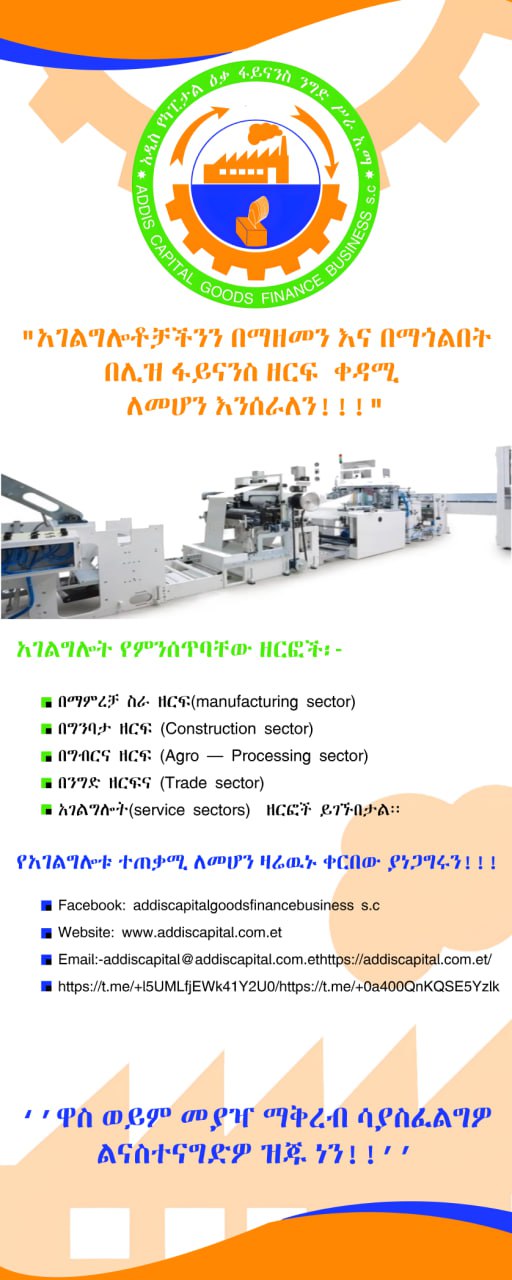

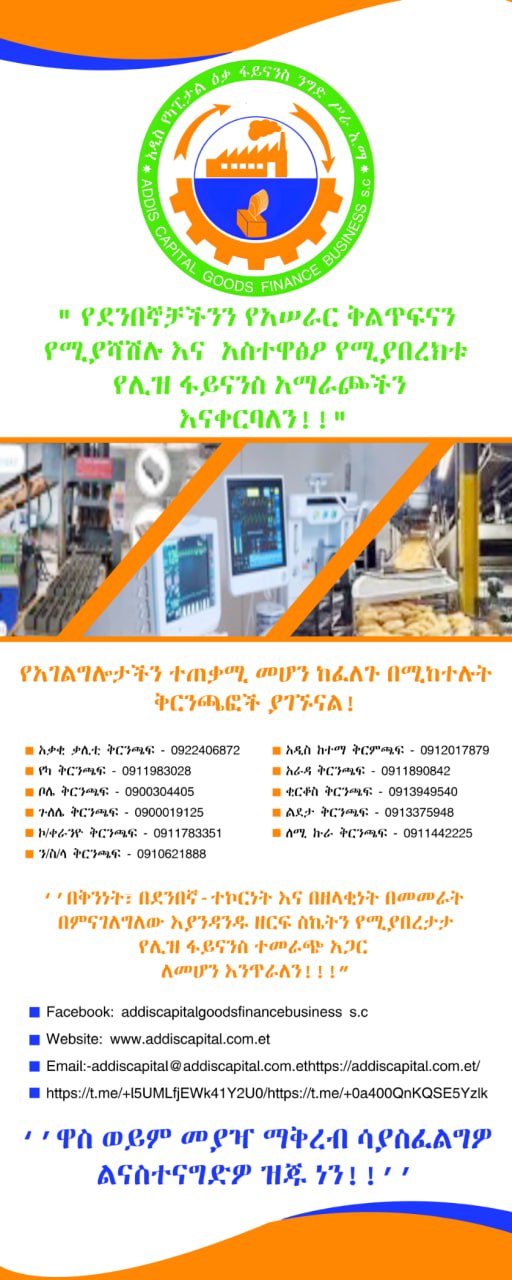
.

.
የማሽን ብድር፡ ለስራ ፈጣሪዎች ምን ያህል አቅም እየሆናቸው ነው?
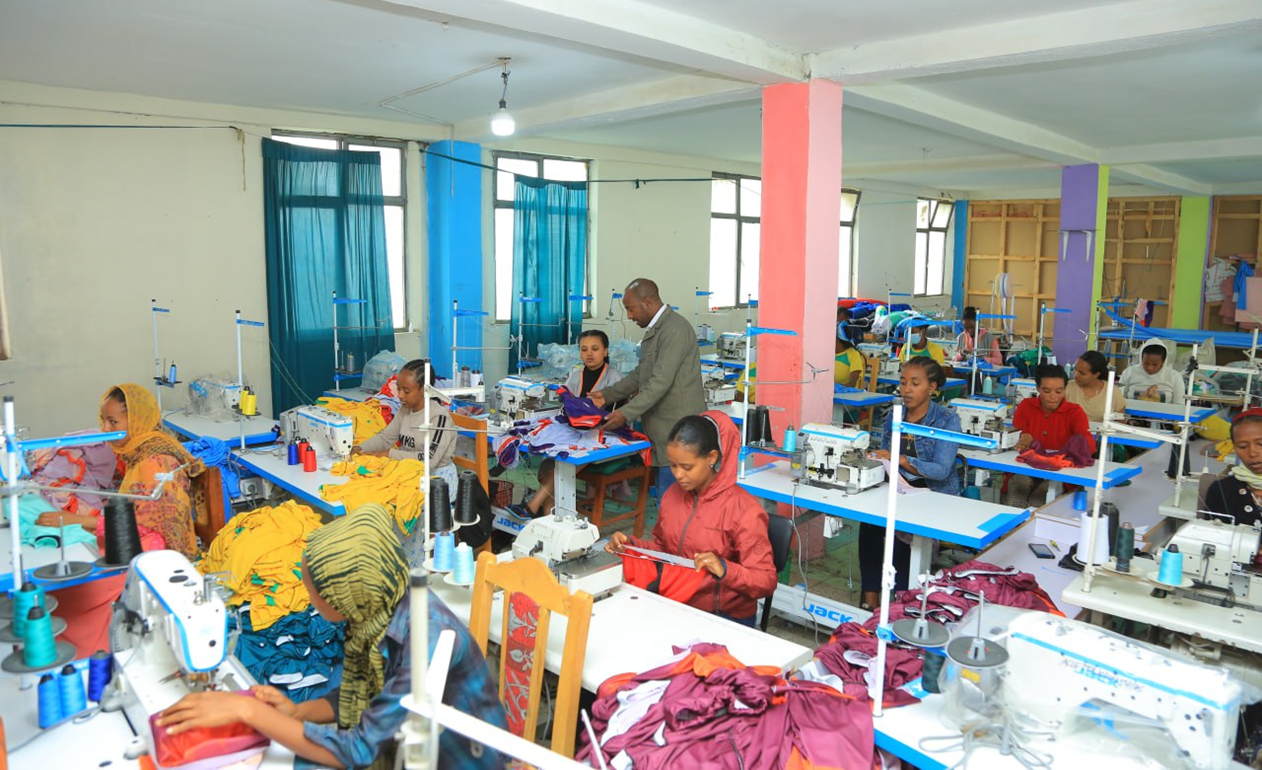
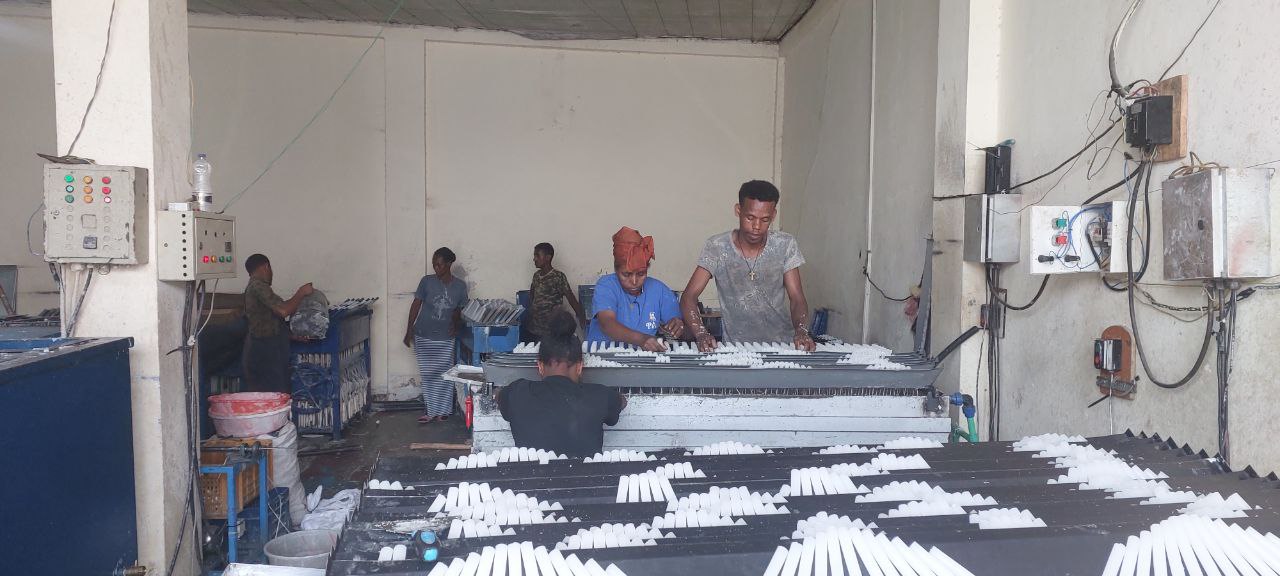
.



